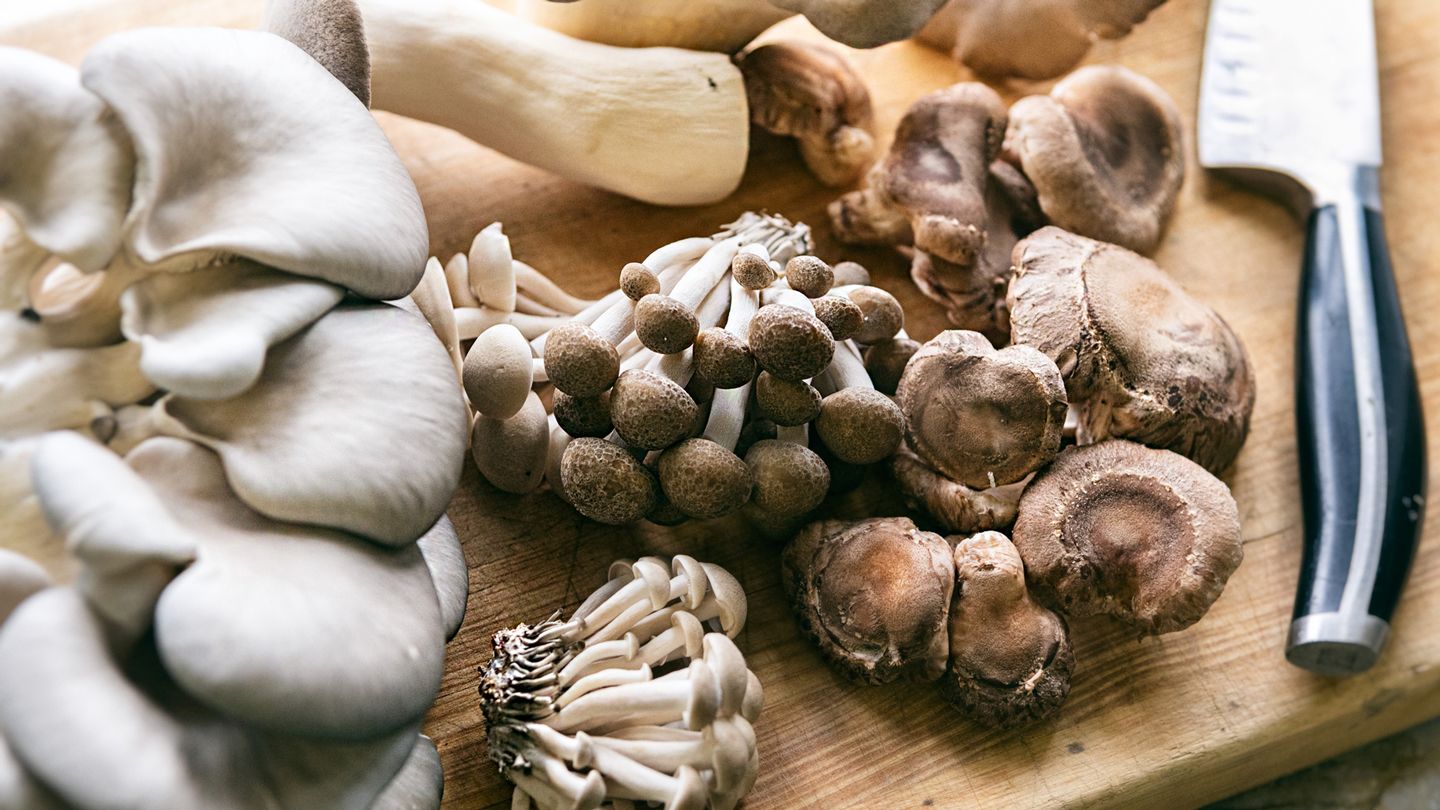Mushrooms are edible fungus that can provide several important nutrients. Simple white cuisine, such as white bread, white rice, and white pasta, doesn’t have the best reputation when it comes to choosing nutrient-rich foods for your meals. But there is a white-colored treat that you should pile on your plate: mushrooms!
Mushrooms are a nutty-flavored, nutrient-rich treat, selenium and ergothioneine, two powerful antioxidants, are found in mushrooms. The formation of red blood cells is also supported by the presence of copper and vitamins in them.
Mushrooms are an exception to the rule that white foods are typically low in nutrients. Numerous minerals are present in them, including copper, iron, selenium, potassium, and phosphorus, that are not often found in plant-derived foods.
Another fantastic thing about mushrooms is that they come in a wide variety of intriguing flavors and textures, from delicate chanterelles to earthy hen-of-the-woods and rich, meaty Portobello. All mushrooms possess an outstanding nutrient profile, so while some may be praised above others, at the end of the day you can enjoy the advantages by choosing whatever is available at your local grocery store, fits in with your budget, and works best with the meal you’re making.
The Health Benefits of Mushroom
1. Prevention of Cancer
According to a study, mushrooms’ antioxidant content may aid in the prevention of cancers of the breast, prostate, and other organs. A minor amount of vitamin D is also present in mushrooms. Although another report notes that the impact may differ from person to person, there is evidence that vitamin D supplementation may aid in the prevention or treatment of various types of cancer.
Another antioxidant found in mushrooms is choline. Consuming choline may lower your risk of developing various cancers, according to some research, however others claim it may increase your risk of developing prostate cancer. It is important to remember that eating consuming a nutrient as a supplement is not the same as consuming it in the diet.
2. Mushrooms may help keep you young
According to a 2017 Penn State study, mushrooms have an extremely high content of the antioxidants ergothioneine and glutathione. Together, these antioxidants work even harder to shield the body from the physiological stress that results in outward signs of aging.
3. Prevention of Diabetes
Type 2 diabetes is one of many health issues that dietary fiber may help treat. People who consume a lot of fiber may have a lower chance of acquiring type 2 diabetes, according to a 2018 review of meta-analyses. Fiber may lower blood glucose levels for people who already have it. A cup of raw, sliced mushrooms weighing 70 grams (g), provides almost 1 g of fiber. The Dietary Guidelines for Americans recommend that adults consume 22.4–33.6 g of dietary fiber each day, depending on sex and age. Mushrooms can all help a person meet their daily fiber needs.
4. As you age, Mushrooms can help Protect your Brain
According to a long-term Spanish study published in 2021, certain foods high in polyphenols, such as red wine, coffee, cocoa, and mushrooms, may help prevent cognitive loss in elderly people. The antioxidants glutathione and ergothioneine may aid in the prevention of Parkinson’s and Alzheimer’s disease, according to Penn State researchers. To lower your risk of developing neurological diseases in the future, they advise consuming at least five button mushrooms daily. For the best preservation of the mushrooms’ nutritional value, cook them either on the grill or in the microwave.
5. Your Mood can be Improved by Mushrooms
Further research by Penn State scientists in 2021 revealed a link between regular use of mushrooms and a lower risk of developing depression in a group of nearly 24,000 individuals. Once more, the authors speculate that this is because ergothioneine may lessen the danger of oxidative stress, which in turn lessens depressive symptoms. They advise eating button mushrooms since they have potassium, which may help with anxiety reduction.
6. Your Memory may be Improved by Mushrooms
Another advantage of eating cooked mushrooms is that, according to a 2019 study by researchers at the National University of Singapore, doing so may lower your risk of moderate cognitive deterioration.
7. Mushrooms can help your Heart Health
Mushrooms contain fiber, potassium, and vitamin C that may help maintain cardiovascular health. Blood pressure control with potassium may reduce the risk of hypertension and cardiovascular disease. The American Heart Association (AHA) advises cutting back on added salt consumption and increasing consumption of potassium-rich foods.
The recommended daily intake of potassium is 4,700 milligrams (mg), according to current recommendations. The AHA has a list of foods that are high in potassium that includes mushrooms. According to a 2017 study, those who lack vitamin C are more prone to develop cardiovascular disease, and getting enough vitamin C may help avoid this condition. They found no proof that taking vitamin C supplements can lower the risk of this type of disease.
There is some evidence that consuming a type of fiber called beta-glucans may lower blood cholesterol levels. Beta-glucans occur in the cell walls of many types of mushrooms. The stem of the shiitake mushrooms is a good source of beta-glucans.
8. Your Bones can become Stronger with the help of Mushrooms
Pick up a “UVB”-branded package at the store. Why is that? In contrast to mushrooms cultivated in the dark, those that are grown outdoors in UV light are a rich source of vitamin D. These UVB-labeled mushrooms have efficiently transformed the substance ergosterol into vitamin D. This indicates that consuming just 3 ounces of UVB-exposed mushrooms can satisfy your daily vitamin D needs and improve the health of your bones.
9. Mushrooms might help you feel more Energized
Riboflavin (B2), folate (B9), thiamine (B1), pantothenic acid (B5), and niacin (B3) are among the B vitamins that are abundant in mushrooms. These aid in the body’s utilization of the fuel from our diet and the production of red blood cells, which transport oxygen throughout the body
10. The Benefit to Pregnant Women
To improve the health of the fetus, many pregnant women take pills containing folic acid, or folate, but mushrooms can also provide folate. The amount of folate in a cup of whole, raw mushrooms is 16.3 mcg. Adults should ingest 400 mcg of folate per day, according to current recommendations.

Nutrition
The nutrients fiber, protein, and antioxidants in mushrooms are abundant and low in calories. They might also lower the chance of getting serious illnesses like diabetes, cancer, heart disease, and Alzheimer’s.
Mushrooms are also great sources of:
- Selenium
- Copper
- Thiamin
- Magnesium
- Phosphorous
Nutrients Per Serving
One cup of crimini mushrooms contains:
- Calories: 15
- Protein: 2.2 grams
- Fat: 0.2 grams
- Carbohydrates: 2.3 grams
- Fiber: 0.7 grams
- Sugar: 1.4 grams
Portion Sizes
A normal serving size of chopped mushrooms is one cup. Mushrooms can often replace meat in recipes because of their umami texture.
Mushroom Preparation
Nearly always, you can find mushrooms in the produce area of any grocery or health food store. Since many mushroom species are deadly and difficult to differentiate from edible kinds, it is not advised to gather them from the wild.
You can consume crimini mushrooms sliced or unsliced, raw or cooked. They can be sautéed in a hot skillet or boiled in water for about 5 minutes until soft. The mushrooms should be sautéed for around eight minutes over medium heat, stirring regularly, until they are brown at the edges. Chopped mushrooms can be sprinkled raw over your meals to add a little more texture and flavor. Just make sure to wash them thoroughly first.
Here are some well-liked methods for including more mushrooms in your diet:

- Add mushrooms into your homemade pizza.
- Sprinkle chopped crimini mushrooms on salads
- Using butter and garlic, prepare mushrooms for a delectable side dish.
- Include mushrooms in your pasta sauce.
- Cooked beef, chicken, or turkey should be combined with mushrooms.
- Make cream of mushroom soup
- Add mushrooms into a stir-fry alongside other vegetables
- Eat mushrooms with eggs in the morning.
